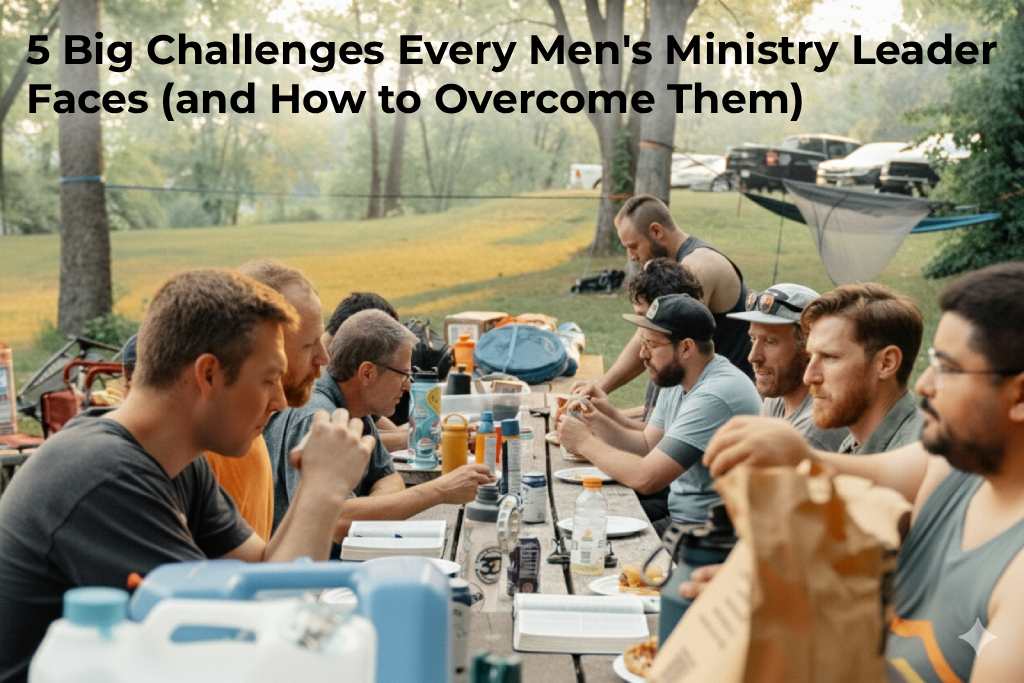
When I talk with other men’s leaders, the same questions seem to come up again and again. They’re the same questions I wrestle with myself. How do I help guys care more about their spiritual lives? How do we reach young men? How do we build authentic community where men talk about real struggles? And how do I help my pastor see that men’s ministry isn’t just “another program,” but a vital piece of the church’s mission?
If you’ve ever asked these, you’re not alone. Let me share some things I’ve been learning as I walk through these challenges with the men God has entrusted to me.
1. Fighting Apathy
Apathy is one of the toughest battles we face. Men drift. We get distracted. We succumb to being too comfortable, fat, and lazy. Some just don’t see how following Jesus really connects with everyday life. I’ve learned that the answer isn’t shaming them into action, but helping them catch a vision. When a man realizes that walking with Christ shapes how he leads his family, how he works with integrity, and how he faces trials, it suddenly becomes real.
For me, the most effective approach has been personal invitation. Sitting across from a brother with a cup of coffee, looking him in the eye, and telling him, “God is challenging you right now. I want to see you grow.” That kind of personal investment breaks through indifference far more than any program announcement ever could.
2. Reaching the Next Generation
Young men don’t need entertainment. They don’t need flashiness and all sorts of “exciting” things. Instead, they need purpose. They’re longing for older men to walk with them, to listen, and to challenge them. I’ve noticed that when we give younger men real responsibility—leading a prayer, sharing a testimony, or serving in tangible ways—then they will begin to take ownership.
I’ve also seen how helpful it is to create spaces where they can ask hard questions without being shut down. Whether it’s a late-night hangout for some diner grub, a short devotional before a basketball game, or serving together on a project, they want to know this faith works in real life.
3. Building Honest Community
If we want men to open up, it starts with us as leaders. When I’m willing to admit my struggles and ask for prayer, it creates space for others to do the same. Too often, men hide behind jokes or surface-level chatter. We naturally want to appear to be all “alpha male” and tough, like we have no real vulnerabilities. But when someone says, “Guys, here’s where I’m really battling temptation this week,” or “I really blew it a few days ago,” the conversation shifts to what really matters.
One way I’ve seen this grow is through smaller circles of trust. It doesn’t happen in a large group right away, but in twos and threes where men can be honest without fear of gossip. Over time, that culture of vulnerability spreads.
4. Gaining Pastoral Support
Sometimes pastors don’t push men’s ministry simply because they’re overwhelmed. They’re trying to carry the whole church. What I’ve found is that if I frame men’s ministry as a way to strengthen the pastor’s overall vision—not compete with it—it changes the conversation.
I make it clear that my goal isn’t to create another siloed ministry but to build up men who will lead at home, love their wives, disciple their children, and serve faithfully in the church. Most pastors will agree that one of the most important ways to building a thriving, godly church is to build thriving, godly men at home who will lead their wives and children in Christ. When a pastor sees a way to get men to step up in maturity, the he quickly realizes how vital men’s ministry can be.
5. Sustaining Momentum
One of the biggest challenges in men’s ministry is keeping men engaged beyond a single event or short season. It is easy to fill a room for a big breakfast or a retreat, but much harder to see men consistently walk with Christ months and years down the road. I have found that momentum is sustained when discipleship becomes a rhythm, not a one-time spark.
That means building structures where men grow together week after week. Small groups, prayer partnerships, or mentoring relationships carry far more long-term weight than a calendar of big gatherings. Events can be a great entry point, but discipleship happens in the ongoing grind of everyday life. When men see real friendships forming, honest accountability, and spiritual growth, they will stick around and invest deeply.
A Call to Action
Brothers, here’s the bottom line: men’s ministry is not optional. If we want strong churches, we need strong men. If we want the next generation to walk with Christ, we need older men to step up and disciple them. If we want real community, we need to risk vulnerability.
So here’s my challenge to you: start with one man. Invite him out for coffee. Ask him how he’s really doing. Share a bit of your own journey. Pray with him. Then do it again with someone else. Don’t wait for a perfect program or a green light from every leader. Step in, lead boldly, and trust God to multiply your efforts.

Looking for a Practical Men’s Discipleship Resource?
Warrior Disciple: Discipleship Manual for Men provides a flexible framework for equipping men to grow in Scripture, prayer, and obedience to Christ. Use it one-on-one or in a group setting. It is simple to start, and designed to build strong, Gospel-centered manhood.

One Comment
Jeffrey. Odonkor
I will like to know more